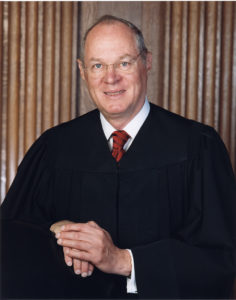Post-Kennedy Panic Justice Kennedy was far from perfect, but how bad will things be now?
 Outgoing Supreme Court Justice Anthony Kennedy
Outgoing Supreme Court Justice Anthony Kennedy Panic is in the air. The announcement of Justice Anthony Kennedy’s retirement might have been welcomed by humanists if there was any likelihood that his replacement would be someone whose jurisprudence furthers human-centered public policy. But with Donald Trump in the White House and Republicans holding a majority in the Senate, that likelihood seems slim. Thus, we face a grim reality: a judicial landscape that, for humanists, is almost certain to change for the worse.
As is widely known, without Kennedy the Supreme Court is divided evenly on many issues between the liberal and conservative camps. Justices Ruth Bader Ginsburg, Stephen Breyer, Sonia Sotomayor, and Elena Kagan are the four reliable liberal votes, whereas Chief Justice John Roberts together with Justices Clarence Thomas, Samuel Alito, and Neil Gorsuch are the predictable conservative block.
Kennedy, of course, was the swing vote. A Reagan appointee who was conservative on many issues, he nevertheless joined the liberal side on many close votes on important social issues. Those issues are all in danger as Trump selects a new nominee.
Perhaps most obviously, Kennedy was pivotal in two landmark same-sex marriage decisions: United States v. Windsor (2013), striking down the federal Defense of Marriage Act, which defined marriage as being only between a man and a woman, and Obergefell v. Hodges (2015), which ruled that states cannot limit the definition of marriage as such. Kennedy not only joined the four liberals in those cases, he wrote the opinions.
Kennedy also joined liberals and wrote the opinion in the 2003 case of Lawrence v. Texas, which struck down state anti-sodomy laws. It’s hard to imagine Trump, with his loyal base of religious-right supporters, appointing anyone who would do the same. How hostile will the new court be to gay rights? Only time will tell.
Kennedy had an imperfect record on church-state separation (for example, he wrote the 2014 Town of Greece v. Galloway decision upholding sectarian legislative prayer), but on several key cases he was important in defending Jefferson’s wall of separation. In the 1992 case of Lee v. Weisman, for example, the Supreme Court in a 5-4 decision ruled that prayers at public school graduation ceremonies are unconstitutional. Conservatives had expected Kennedy to join them in upholding the prayers, but to the surprise of many he wrote the opinion ruling for the plaintiff who objected to the prayers. (This was much to the chagrin of Justice Antonin Scalia, who wrote a scathing dissent.)
Kennedy was also on the right side in the 2000 case of Santa Fe School District v. Doe, which ruled that prayers at public school football games are unconstitutional. This was a 6-3 decision, but only two of the majority justices remain on the court, and the looming conservative block, with one more vote, would almost certainly see the case differently.
Then, of course, there’s the issue of abortion. Though Kennedy has not been an absolutist in supporting abortion rights, showing tolerance for some measures that restrict a woman’s right to choose, few believe that he would be eager to overturn Roe v. Wade. The current conservative block, however, doesn’t exactly exude restraint, and it will almost certainly be emboldened if it sees that it has a stronger, more reliable majority.
Hang on, humanists, we might be in for a rough and extended ride.
